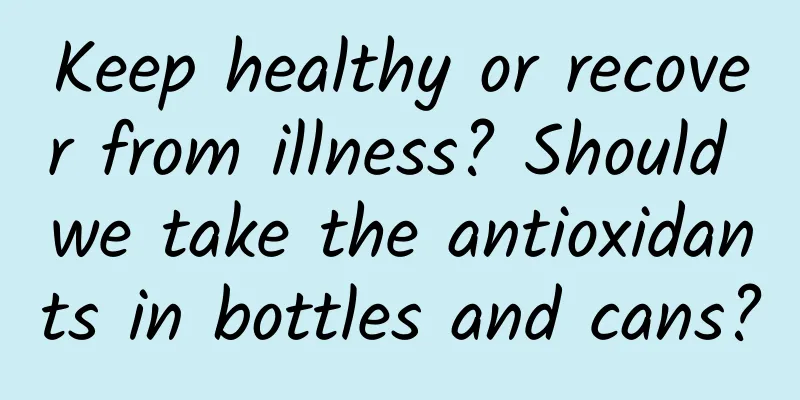Keep healthy or recover from illness? Should we take the antioxidants in bottles and cans?

|
I heard that taking antioxidants can resist aging, cancer and inflammation, so many hard-working office workers spent a lot of money to buy a lot of bottles of antioxidants. It seems that the concept of health preservation is no longer exclusive to the elderly, but has become younger and younger. However, can the antioxidants in these bottles and cans be compared with the antioxidants naturally present in food? Is eating them good for health or for curing illness? In this article, we will talk about antioxidants and how to take antioxidants in the safest way. Are antioxidant supplements helpful or harmful? Usually, most people are busy with work and study, and often ignore the nutritional combination of meals. The phenomenon of unbalanced diet is particularly common, so many people choose to take multivitamins to make up for the nutritional deficiencies. Just like the mentality of supplementing vitamins and minerals, some people also choose to eat bottles of antioxidants to maintain their health. Appropriate intake of antioxidant ingredients is indeed beneficial to health. After all, antioxidants have many functions such as preventing cancer, preventing chronic inflammation and improving immunity. For example, beta-carotene is a type of antioxidant that not only prevents free radicals from damaging cells through the oxidation process, but can also be converted into vitamin A in the body, which is beneficial to the health of the eyes and skin. Vitamin E is another example of a very strong antioxidant that can reduce the formation of lipofuscin in cells, prevent the appearance of age spots on the skin, improve skin elasticity, enhance immunity, and fight cancer. [1] However, there has always been controversy over whether taking antioxidant supplements from bottles and cans is good for health. Some people believe that supplementing with beta-carotene and vitamin E supplements may not necessarily be good for health, and the content in the supplements is not low, far exceeding the body's needs, and it is easy to overdose, and in some cases may even cause harm. While antioxidants protect cells from oxidative damage, they also protect some genes and proteins that are associated with the spread of cancer. Some studies have shown that high doses of antioxidant supplements may be associated with health risks in some cases. High doses of beta-carotene supplementation may increase the risk of lung cancer in smokers. High doses of vitamin E supplementation may increase the risk of prostate cancer and a type of stroke caused by bleeding in the brain. [2] Another women's health study, which included nearly 40,000 healthy women aged 45 and older, found that vitamin E supplements did not reduce the risk of heart attack, stroke, cancer, age-related macular degeneration, or cataracts.[2] A study published in the authoritative scientific journal Cell transplanted human non-small cell lung cancer cells into mice and gave some mice antioxidants (NAC and vitamin E) for observation. The results showed that the cancer cells in the mice taking antioxidants spread and metastasized faster. [3] This is because antioxidants protect DNA and normal cells from free radical damage while also protecting molecules such as BACH1 that are related to the spread of cancer cells. When these molecules accumulate in large quantities, they promote the spread and metastasis of cancer cells. Furthermore, in order for antioxidants to work, they may need the synergistic effect of other nutrients, and only natural foods can better meet this need; and the effects of large doses of antioxidants used in supplement studies may be different from the effects of small amounts of antioxidants consumed in food, so a single antioxidant supplement may not necessarily be good for health. In addition, anti-oxidation is to remove excess free radicals. Appropriate free radicals are beneficial to our health, helping to kill pathogens, are part of the human immune system, and contribute to maintaining a healthy state of the body. If you take excessive doses of antioxidants every day, a large intake of antioxidants may upset the balance and be detrimental to your health. It is safer to eat these antioxidants: Since the effects of antioxidants on health are still controversial, why not just rely on adjusting diet and lifestyle habits to prevent oxidation? This is not only safer and more reliable, but can also supplement other nutrients at the same time. How to do it specifically? -Eat more fruits and vegetables rich in vitamin C: Fresh fruits and vegetables are rich in vitamin C, such as bell peppers, bitter melons, Chinese cabbage, kiwis, grapefruits, oranges, tangerines, etc. Among them, bell peppers are the most recommended. Eating about half a bell pepper can meet the daily vitamin C needs of the general population. Vitamin C is an antioxidant that can remove free radicals, prevent lipid peroxidation, and prevent oxidative damage to the microcirculatory system. -Eat more dark vegetables: Pay special attention to supplementing dark vegetables. It is best that dark vegetables account for more than half of the vegetables eaten every day, because most dark vegetables contain antioxidants such as β-carotene, anthocyanins, and lycopene. For example, carrots, pumpkins, spinach, leeks, chicory, celery leaves, shepherd's purse, chrysanthemums, broccoli, etc. are rich in β-carotene; purple cabbage, purple onions, red amaranth, etc. are rich in anthocyanins; tomatoes and cherry tomatoes are rich in lycopene. -Eat nuts every day: As for supplementing vitamin E, the nuts we usually eat are a good source of vitamin E, followed by egg yolks and cooking oil. How much should we eat? Eat 300-500 grams of vegetables every day. 100 grams of raw vegetables is about the weight of one fist after being cooked. Eat 200-350 grams of fruit every day, about two fists. Eat 10 grams of nuts every day, about one handful. So from a dietary perspective, vegetables, fruits, nuts and other foods are good sources of antioxidants, and can also supplement other nutrients. As long as we have a balanced diet, we don’t have to worry too much about antioxidant issues. This is also the safest way to supplement. In addition, it is also recommended to drink more green tea. Tea contains tea polyphenols, tea polysaccharides and flavonoids, all of which have the ability to scavenge free radicals and resist oxidation. Although tea contains tea polyphenols, the content of green tea is higher than that of semi-fermented oolong tea and higher than that of black tea, so green tea is the most recommended. [4] However, it is important to note that when brewing green tea, do not use water that is too hot. When the water temperature is controlled at 60°C to 80°C, the yield of tea polyphenols is higher, while when the temperature is between 90°C and 100°C, the yield of tea polyphenols will decrease. Generally speaking, the yield of tea polyphenols increases with the extension of brewing time. [5] Summarize: Don’t go crazy supplementing with bottles of antioxidants just for the sake of anti-oxidation. They are quite expensive. It’s better to spend more money on your diet. Dietary supplements are the most reliable, safe and effective. In addition, the antioxidants in the bottle may interact with medications or other supplements. For example, vitamin E supplements may increase the risk of bleeding in people taking anticoagulant drugs (blood thinners). Therefore, if you want to take antioxidants for some special reason, it is best to consult a doctor according to your own situation and do not take them without authorization. References: [1] Yang Yuexin, Ge Keyou. Chinese Nutrition Science Encyclopedia 2nd Edition (Volume 1)[M]. People's Medical Publishing House, 2019 [2]https://www.nccih.nih.gov/health/antioxidants-in-depth [3]Wiel, C., Le Gral, K., Ibrahim, MX, Jahangir, CA,Kashif, M., Ziegler, DV, Xu, [4] Feng Tuo, Shan Pei, Zhang Zhanzhang, Gao Xianli, Ma Haile, Wang Bo. Analysis of antioxidant activity and antioxidant substances of 16 commercially available teas[J]. Journal of Chinese Institute of Food Science and Technology, 2022, 22(10): 352-362. DOI: 10.16429/j.1009-7848.2022.10.037. [5] Mi Zhi, Liu Lizhen, Wu Xiaohong, Cheng Meng. Effect of brewing conditions on the yield of tea polyphenols in sunshine green tea[J]. Food Research and Development, 2021, 42(03): 63-67. The article is produced by Science Popularization China-Creation Cultivation Program. Please indicate the source when reprinting. Author: Xue Qingxin, member of Chinese Nutrition Society, registered dietitian, health manager, public nutritionist Reviewer: Ruan Guangfeng, Deputy Director of Kexin Food and Health Information Exchange Center Source: Starry Sky Project |
<<: Why is beef so sticky? 5 secrets hidden in the taste of food
Recommend
What causes nipple acne?
If we don't pay attention to some details in ...
Can I wash my vulva during menstruation?
Menstruation is a continuous process, which norma...
Can I abort my pregnancy at 20 days?
Many women have irregular menstruation, so when t...
How to improve the sound insulation effect during decoration? What methods can improve the sound insulation effect during decoration?
We all know that house decoration is a very compl...
Reduce the number of window openings for ventilation in winter and follow the "Seven Musts" for home cleaning and disinfection
The weather is cold in winter, people open window...
The consequences of female yin deficiency and yang hyperactivity
Women's yin deficiency and yang hyperactivity...
What to do if your period has less blood
All women will suffer from gynecological problems...
What is the difference between ovary and appendages?
Many people think that there is not much differen...
What are the symptoms of ectopic pregnancy and how to judge it?
Ectopic pregnancy seriously threatens the life an...
What should I do if my period is delayed by 14 days?
Menstruation is also called period in books. The ...
How to use cleansing oil to remove makeup cleanly
When removing makeup, you must remove it cleanly....
What causes vaginal acne?
Reproductive health issues are certainly issues t...
What should you pay attention to when taking medication for diarrhea in children?
There are many kinds of antidiarrhea drugs for ch...
How to treat vulvar ulcers?
The female genitals are very hidden. Because ther...
Does cooler weather affect the spread of the virus? Why is it not easy for the coronavirus to die in low temperatures?
The emergence of the new coronavirus has plunged ...









